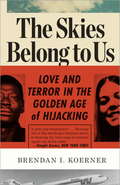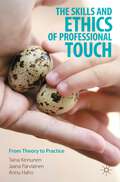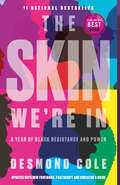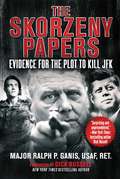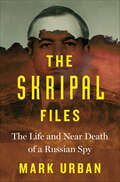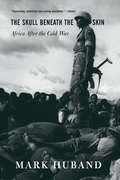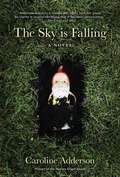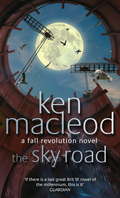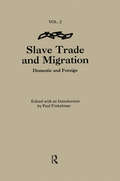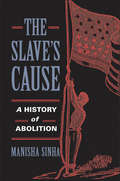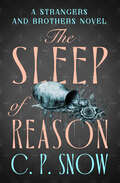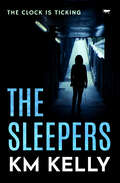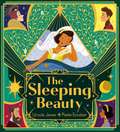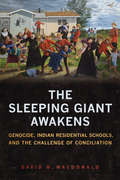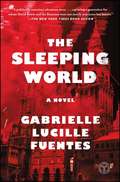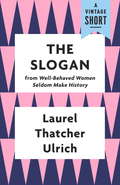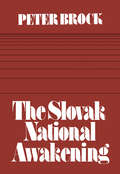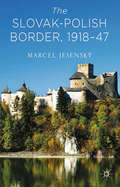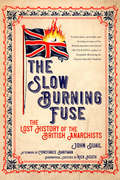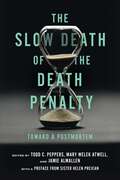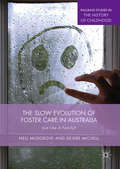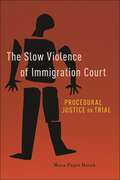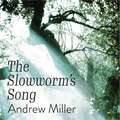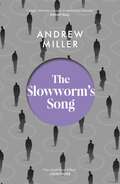- Table View
- List View
The Skies Belong to Us: Love and Terror in the Golden Age of Hijacking
by Brendan I. KoernerIn an America torn apart by the Vietnam War and the demise of '60s idealism, airplane hijackings were astonishingly routine. Over a five-year period starting in 1968, the desperate and disillusioned seized commercial jets nearly once a week, using guns, bombs, and jars of acid. Some hijackers wished to escape to foreign lands; others aimed to swap hostages for sacks of cash. Their criminal exploits mesmerized the country, never more so than when shattered Army veteran Roger Holder and mischievous party girl Cathy Kerkow managred to comandeer Western Airlines Flight 701 and flee across an ocean with a half-million dollars in ransom--a heist that remains the longest-distance hijacking in American history.More than just an enthralling story about a spectacular crime and its bittersweet, decades-long aftermath, The Skies Belong to Us is also a psychological portrait of America at its most turbulent and a testament to the madness that can grip a nation when politics fail. tale, which involves a cast of characters ranging from exiled Black Panthers to African despots to French movie stars. He combed through over 4,000 declassified documents and interviewed scores of key figures in the drama--including one of the hijackers, whom Koerner discovered living in total obscurity. Yet The Skies Belong to Us is more than just an enthralling yarn about a spectacular heist and its bittersweet, decades-long aftermath. It is also a psychological portrait of America at its most turbulent, and a testament to the madness that can grip a nation when politics fail.
The Skills and Ethics of Professional Touch: From Theory to Practice
by Taina Kinnunen Jaana Parviainen Annu HahoThis book introduces readers to the ethical and goal-oriented functions of touch in professional practice. Touch is both an increasingly visible topic today and a core skill in many professions, especially in health, education and social work. This book combines helpful theoretical discussions and practical information, offering a balanced and culturally-informed introduction to an issue that both students and professionals often find difficult to navigate. Chapters discuss the various functions of touch and its uses, giving readers a deeper understanding of the potential of tactile work practices. The authors offer clear legal and ethical guidance to empower learners. They discuss key issues such as harmful touch and the increasing digitisation of patient work. Activities, case studies and further readings promote learning and help readers reflect on their own relationship to touch. This book will be an invaluable resource for students in undergraduate and graduate courses in healthcare, nursing, education and social work, and to practitioners looking for guidance on this topic.
The Skin We're In: A Year of Black Resistance and Power
by Desmond ColeA bracing, provocative, and perspective-shifting book from one of Canada's most celebrated and uncompromising writers, Desmond Cole. The Skin We're In will spark a national conversation, influence policy, and inspire activists. <P><P>In his 2015 cover story for Toronto Life magazine, Desmond Cole exposed the racist actions of the Toronto police force, detailing the dozens of times he had been stopped and interrogated under the controversial practice of carding. The story quickly came to national prominence, shaking the country to its core and catapulting its author into the public sphere. Cole used his newfound profile to draw insistent, unyielding attention to the injustices faced by Black Canadians on a daily basis. <P><P>Both Cole’s activism and journalism find vibrant expression in his first book, The Skin We’re In. Puncturing the bubble of Canadian smugness and naive assumptions of a post-racial nation, Cole chronicles just one year—2017—in the struggle against racism in this country. It was a year that saw calls for tighter borders when Black refugees braved frigid temperatures to cross into Manitoba from the States, Indigenous land and water protectors resisting the celebration of Canada’s 150th birthday, police across the country rallying around an officer accused of murder, and more. <P><P>The year also witnessed the profound personal and professional ramifications of Desmond Cole’s unwavering determination to combat injustice. In April, Cole disrupted a Toronto police board meeting by calling for the destruction of all data collected through carding. Following the protest, Cole, a columnist with the Toronto Star, was summoned to a meeting with the paper’s opinions editor and informed that his activism violated company policy. Rather than limit his efforts defending Black lives, Cole chose to sever his relationship with the publication. Then in July, at another police board meeting, Cole challenged the board to respond to accusations of a police cover-up in the brutal beating of Dafonte Miller by an off-duty police officer and his brother. When Cole refused to leave the meeting until the question was publicly addressed, he was arrested. The image of Cole walking out of the meeting, handcuffed and flanked by officers, fortified the distrust between the city’s Black community and its police force. <P><P>Month-by-month, Cole creates a comprehensive picture of entrenched, systemic inequality. Urgent, controversial, and unsparingly honest, The Skin We’re In is destined to become a vital text for anti-racist and social justice movements in Canada, as well as a potent antidote to the all-too-present complacency of many white Canadians.
The Skorzeny Papers: Evidence for the Plot to Kill JFK
by Dick Russell Ret. Major Ralph P. Ganis UsafIn The Skorzeny Papers, the author reveals the details of the post-World War II activities of former SS Commando Otto Skorzeny. Considered by British and American Allied forces as “the most dangerous man in Europe,” Skorzeny planned and led numerous daring missions throughout the war. The story in this book was extracted by Major Ganis from Skorzeny’s personal papers. The evidence reveals that Skorzeny gradually and methodically became involved in US intelligence and covert operations during the Cold War. But Skorzeny’s network had a greater point of destiny in November 1963, when it was utilized to carry out the most tragic mission in history. This story would have been lost had Skorzeny not kept meticulous records of his businesses and contacts, which were fronts for US covert activity. In the end, The Skorzeny Papers reveal the intriguing web of secret organizations and people linked to the events culminating in the assassination of President John F. Kennedy.
The Skripal Files: The Life and Near Death of a Russian Spy
by Mark UrbanThe explosive story of the poisoning of the former Russian spy Sergei Skripal and what it reveals about the growing clandestine conflict between the West and RussiaSalisbury, England: March 4, 2018.Slumped on a bench, paralyzed and barely able to breathe, were a former Russian intelligence officer named Sergei Skripal and his daughter, Yulia. Sergei had been living a quiet life in England since 2010, when he was expelled from Russia as part of a spy swap; he had been serving a lengthy prison sentence for working secretly for the British intelligence agency MI6. On this Sunday afternoon, he and his daughter had just finished lunch at a local restaurant when they started to feel faint. Within minutes they were close to death.The Skripals had been poisoned, not with a familiar toxin but with Novichok, a deadly nerve agent developed in southern Russia. Was this a message from the Kremlin that traitors would not escape violent death, even on British soil? As Sergei and Yulia fought for their lives, and the British government and their allies sought answers, relations between the West and Russia descended to a new low.The Skripal Files is a remarkable and definitive account of Sergei Skripal’s story, which lays bare the new spy war between Russia and the West. Mark Urban, the diplomatic and defense editor for the BBC, met with Skripal in the months before his poisoning, learning about his career in Russian military intelligence, how he became a British agent, his imprisonment in Russia, and the events that led to his release. Skripal’s first-hand accounts and experiences reveal the high stakes of a new spy game that harks back to the chilliest days of the Cold War.
The Skull Beneath The Skin: Africa After The Cold War
by Mark HubandIn The Skull Beneath the Skin: Africa After the Cold War award-winning journalist Mark Huband argues that foreign involvement in Africa has been the single most destructive element in the continent's history. He argues that the catastrophes that have erupted since the end of the Cold War are a legacy of that long foreign involvement, and that stab
The Sky Is Falling: A Novel
by Caroline AddersonFrom the winner of the 2006 Marian Engel Award comes a funny, absorbing and timely novel about fear in our time. On a spring day in 2004, Jane Z. a physician’s wife and mother of a teenage son, opens her morning newspaper and is shocked to see a familiar face on the front page. Sonia, a lost friend accused of terrorism, has just been released after twenty years in prison. It all comes flooding back to Jane, how twenty years before her life took a very different course. At nineteen, Jane rents a room in a shared student house with a mismatched trio of idealists: Sonia, who yearns to save the world’s children from nuclear war; the Marxist-leaning Dieter; and the anarcho-feminist-pacifist Pete. A bookish misfit, her radical housemates quickly draw Jane into NAG!, a non-violent, anti-nuclear direct action group. To Jane, who is studying Russian and Russian literature, her compatriots, with their utopian dreams and youthful pathos, soon seem Chekhovian to her. Meanwhile, NAG! plans its most ambitious action, crossing the border into the United States to chain themselves to the Boeing factory fence. Tension increases as the group mounts each successive protest, until a bomb explodes and changes everything. The Sky Is Falling deftly intertwines themes of first love, sexual confusion, and the dread of nuclear disaster with the comical infighting of a cast of well-meaning political activists, and the timelessness of the great Russian classics. A story for our own age of paranoia and terror, Caroline Adderson’s witty, accomplished novel returns the reader to another fearful era, when the world teetered on the brink of nuclear annihilation and the end of world seemed inevitable.
The Sky Road: Book Four: The Fall Revolution Series (Fall Revolution Ser. #4)
by Ken MacLeod'Exciting...Accessible to the average reader as well as the hardcore SF fan. This is a work sure to keep the reader on the edge of her seat.' - Romantic Times Bookclub'For my money, Ken MacLeod is the current champion of the very smartest kind of New Space Opera... every variation on his themes produces something worth re-reading.' - LocusCenturies after its catastrophic Deliverance, humanity is again reaching into space. And one young scholar working in the space ship yard, Clovis colha Gree, could make the difference between success and failure. For his mysterious lover, Merrial, has seduced him into the idea of extrapolating the ship's future from the dark archives of the past.A past in which, centuries before, Myra Godwin faced the end of a different space age - her rockets redundant, her people rebellious, and her borders defenceless against the Sino-Soviet Union. As Myra appealed to the falling empires of the West for help, she found history turning on her own dubious past - and on her present decisions. Decisions which, centuries later, will determine the future of the new space age. Merrial's people, the itinerant computer engineers, know this. And they know that the truth they seek lies within the secret files left by Myra Godwin.Set hundreds of years in the future, THE SKY ROAD is the astonishing story of the dawn of a new space age, from the most exciting British SF author to have emerged in recent years.Books by Ken MacLeod:Fall RevolutionThe Star FractionThe Stone CanalThe Cassini DivisionThe Sky RoadEngines of LightCosmonaut KeepDark LightEngine CityCorporation Wars TrilogyDissidenceInsurgenceEmergenceNovelsThe Human FrontNewton's WakeLearning the WorldThe Execution ChannelThe Restoration GameIntrusionDescent
The Sky Road: Book Four: The Fall Revolution Series (Fall Revolutions #4)
by Ken MacLeod'Exciting...Accessible to the average reader as well as the hardcore SF fan. This is a work sure to keep the reader on the edge of her seat.' - Romantic Times Bookclub'For my money, Ken MacLeod is the current champion of the very smartest kind of New Space Opera... every variation on his themes produces something worth re-reading.' - LocusCenturies after its catastrophic Deliverance, humanity is again reaching into space. And one young scholar working in the space ship yard, Clovis colha Gree, could make the difference between success and failure. For his mysterious lover, Merrial, has seduced him into the idea of extrapolating the ship's future from the dark archives of the past.A past in which, centuries before, Myra Godwin faced the end of a different space age - her rockets redundant, her people rebellious, and her borders defenceless against the Sino-Soviet Union. As Myra appealed to the falling empires of the West for help, she found history turning on her own dubious past - and on her present decisions. Decisions which, centuries later, will determine the future of the new space age. Merrial's people, the itinerant computer engineers, know this. And they know that the truth they seek lies within the secret files left by Myra Godwin.Set hundreds of years in the future, THE SKY ROAD is the astonishing story of the dawn of a new space age, from the most exciting British SF author to have emerged in recent years.Books by Ken MacLeod:Fall RevolutionThe Star FractionThe Stone CanalThe Cassini DivisionThe Sky RoadEngines of LightCosmonaut KeepDark LightEngine CityCorporation Wars TrilogyDissidenceInsurgenceEmergenceNovelsThe Human FrontNewton's WakeLearning the WorldThe Execution ChannelThe Restoration GameIntrusionDescent
The Slave Trade & Migration (Articles on American Slavery)
by Paul FinkelmanFirst Published in 1990. Routledge is an imprint of Taylor & Francis, an informa company.
The Slave's Cause: A History of Abolition
by Manisha Sinha&“Traces the history of abolition from the 1600s to the 1860s . . . a valuable addition to our understanding of the role of race and racism in America.&”—Florida Courier Received historical wisdom casts abolitionists as bourgeois, mostly white reformers burdened by racial paternalism and economic conservatism. Manisha Sinha overturns this image, broadening her scope beyond the antebellum period usually associated with abolitionism and recasting it as a radical social movement in which men and women, black and white, free and enslaved found common ground in causes ranging from feminism and utopian socialism to anti-imperialism and efforts to defend the rights of labor. Drawing on extensive archival research, including newly discovered letters and pamphlets, Sinha documents the influence of the Haitian Revolution and the centrality of slave resistance in shaping the ideology and tactics of abolition. This book is a comprehensive history of the abolition movement in a transnational context. It illustrates how the abolitionist vision ultimately linked the slave&’s cause to the struggle to redefine American democracy and human rights across the globe. &“A full history of the men and women who truly made us free.&”—Ira Berlin, The New York Times Book Review &“A stunning new history of abolitionism . . . [Sinha] plugs abolitionism back into the history of anticapitalist protest.&”—The Atlantic &“Will deservedly take its place alongside the equally magisterial works of Ira Berlin on slavery and Eric Foner on the Reconstruction Era.&”—The Wall Street Journal &“A powerfully unfamiliar look at the struggle to end slavery in the United States . . . as multifaceted as the movement it chronicles.&”—The Boston Globe
The Sleep of Reason (The Strangers and Brothers Novels)
by C.P. SnowWith England on the brink of disruptive social change, a man revisits his past—and confronts a monstrous crime—in this novel of &“clarity and perceptiveness&” (The Atlantic). In his late middle age, semi-retired Lewis Eliot, accompanied by his teenage son, journeys to the provincial town where he spent his poverty-stricken boyhood—and where his father is now dying. The London of the 1960s is changing, and this visit is a reminder of the passage of time and the world left behind. But Eliot&’s reflections are disrupted when he reunites with his now-elderly mentor, George Passant, and becomes involved in a horrifying child-murder case in which Passant&’s niece stands accused. And as Eliot sees his old friend through the trial, troubling questions arise about responsibility, the root causes of evil, and how, as the painter Goya once observed, the sleep of reason produces monsters. &“[The Strangers and Brothers series] invites comparison not only with Proust but with the other notable multi‐volume novel about modern Britain, Anthony Powell&’s The Music of Time.&” —The New York Times &“Lewis Eliot throughout the series has been a most engaging person. . . . Snow is at his best when writing about people under pressure: he makes the struggle for power of engrossing interest.&” —The Atlantic &“[Snow] looks at the social condition so that he can see better the human condition.&” —Queen&’s Quarterly
The Sleepers
by KM Kelly&“Once you start you just have to know what's going to happen next . . . totally thrilling!&” —Goodreads reviewer, five starsA time bomb is ticking—but what if that time bomb is you? A chilling novel of intrigue, terror, and one man and woman in a race against the clock . . . Sylvie is running. Running from the memories of a terror attack in London she experienced as a child, a catastrophic event in which her brother died. Running from her abusive boyfriend. And running from a warning, given to her on a station platform in Nantes: Someone is trying to kill her. Corran isn&’t really Corran. He&’s working deep undercover to infiltrate the political organisation that looks set to win the upcoming British election—a group that doesn&’t appear to have existed a few years ago. Corran has been sent to find out who&’s behind them and what their true agenda might be. But he messes up. All he has is a list of names, Sylvie&’s included. Only with time does he begin to see the connections. Are those on the list, who were caught up in the London terror attack ten years ago, now being systematically taken out? The hit list will force Corran and Sylvie into a reluctant partnership, and into the centre of a looming threat that could explode at any moment . . . &“Sucks you in from page one and doesn&’t let go. Packed with tremendous action.&” —Rob Samborn, author of The Prisoner of Paradise and Painter of the Damned
The Sleeping Beauty
by Ursula JonesOnce upon a time a baby princess was born. The kingdom's fairies blessed her with happiness, luck, cleverness, kindness and beauty . . . but one wicked fairy was angry at having been left out of the celebration and placed a wicked curse on the little princess. On her sixteenth birthday, the princess would prick her finger and fall into a deep sleep for a hundred years . . . until a handsome prince would wake her with true love's kiss.A magical, updated retelling of the classic fairy tale by award-winning author Ursula Jones, brought to life with glorious illustrations by Paola Escobar. A must-have for any child's library.
The Sleeping Giant Awakens: Genocide, Indian Residential Schools, and the Challenge of Conciliation (UTP Insights)
by David B. MacDonaldConfronting the truths of Canada’s Indian Residential School system has been likened to waking a sleeping giant. In this book, David B. MacDonald uses genocide as an analytical tool to better understand Canada’s past and present relationships between settlers and Indigenous peoples. Starting with a discussion of how genocide is defined in domestic and international law, the book applies the concept to the forced transfer of Indigenous children to residential schools and the "Sixties Scoop," in which Indigenous children were taken from their communities and placed in foster homes or adopted. Based on archival research and extensive interviews with residential school survivors, officials at the Truth and Reconciliation Commission of Canada, and others, The Sleeping Giant Awakens offers a unique and timely perspective on the prospects for conciliation after genocide, exploring how moving forward together is difficult in a context where many settlers know little of the residential schools and the ongoing legacies of colonization, and need to have a better conception of Indigenous rights. It offers a detailed analysis of how the TRC approached genocide in its deliberations and in the Final Report. Crucially, MacDonald engages critics who argue that the term genocide impedes understanding of the IRS system and imperils prospects for conciliation. By contrast, this book sees genocide recognition as an important basis for meaningful discussions of how to engage Indigenous-settler relations in respectful and proactive ways.
The Sleeping World: A Novel
by Gabrielle Lucille Fuentes"A searing, beautifully written novel that captures the exhilaration and dangers of 1970s post-Franco Spain. Mosca, a bitterly jaded young woman, goes on a harrowing search for her missing brother--and the history that destroyed their lives. Violent, heartbreaking, unforgettable, The Sleeping World is a stunning debut" (Cristina Garcia, author of Dreaming in Cuban).Spain, 1977. Military rule is over. Bootleg punk music oozes out of illegal basement bars, uprisings spread across towns, fascists fight anarchists for political control, and students perform protest art in the city center, rioting against the old government, the undecided new order, against the universities, against themselves... Mosca is an intelligent, disillusioned university student, whose younger brother is among the "disappeared," taken by the police two years ago, now presumed dead. Spurred by the turmoil around them, Mosca and her friends commit an act that carries their rebellion too far and sends them spiraling out of their provincial hometown. But the further they go, the more Mosca believes her brother is alive and the more she is willing to do to find him. The Sleeping World is a beautiful, daring novel about youth, freedom, and doing whatever it takes to keep a family together, in a nation whose dead walk the streets and whose wars never end.
The Slogan
by Laurel Thatcher UlrichA selection from the admired history Well-Behaved Women Seldom Make History, the story of how one of feminism's most popular slogans came to life. In the opening paragraph of an obscure 1976 scholarly article investigating the prim and proper women celebrated in Puritan funeral sermons, Harvard professor Laurel Thatcher Ulrich penned the phrase, "Well-behaved women seldom make history." Since then, Ulrich's slogan has been put on bumper stickers, T-shirts, and tote bags, in greeting cards and political speeches, entering the cultural consciousness in all sorts of unexpected ways. In "The Slogan," Ulrich gives a brief history of her much-quoted words, and sketches out a primer on feminism today and the way it continues to make history. An eBook short.
The Slovak National Awakening
by Peter BrockThe Slovaks lived under Hungarian rule for centuries, with no clear sense of political separateness, preserving Slovak as their spoken language, but using Czech as their written language. In the last decades of the 18th and the first half of the 19th centuries, the efforts made by clerical intellectuals to develop a language more closely attuned to Slovak needs led to the rise of Slovak nationalism.The Slovak National Awakening describes the three major stages in the development of national consciousness. In the 1780s Catholic intellectuals began to write in the vernacular; a Catholic priest, Bernolàk, produced a Slovak grammar and dictionary and an influential treatise in defence of Slovak as a language separate from Czech. However, while Slovak ethnic distinctness was being asserted, the sense of belonging to the Hungarian nation was not questioned. The next steps were taken by the Protestant intelligentsia, who had been pro-Czech since the Reformation. Influenced by German concepts of linguistic nationalism, they began to assert Slovak cultural and linguistic separateness, but still within the political framework of the Hungarian State.The third stage in the Slovak Awakening came in the mid-1840s when a group of young Protestant intellectuals, led by L'udovít Štúr, rejected their predecessors' 'Czechoslovakism' and advocated a Slovak language and a Slovak nationality. In 1851, the Catholic Bernolákites and the Protestant Štúrites were able to agree on the language that became the basis of modern Slovak.This study of the relation between language and nationalism will appeal to specialists in European history and will be of interest for the light it throws on modern separatists and anti-imperialist movements.
The Slovak–Polish Border, 1918-1947
by Marcel JesenskýThe first English-language monograph on the Slovak-Polish border in 1918-47 explores the interplay of politics, diplomacy, moral principles and self-determination. This book argues that the failure to reconcile strategic objectives with territorial claims could cost a higher price than the geographical size of the disputed region would indicate.
The Slow Burning Fuse: The Lost History of the British Anarchists (Freedom)
by Constance Bantman John QuailIn the accounts of the radical movements that have shaped our history, anarchism has received a raw deal. Its visions and aims have been distorted and misunderstood, its achievements forgotten. The British anarchist movement during the years 1880–1930, while borrowing from Europe, was self-actuated and independent, with a vibrant tale all its own. John Quail, in this first major work, shows a history largely obscured and rewritten following 1919 and the triumph of Leninist communism. The time has arrived to resurrect the works of the early anarchist clubs, their unsung heroes, tumultuous political activities, and searing manifestos so that a truer image of radical dissent and history can be formed. Quail's story of the anarchists is one of utopias created in imagination and half-realized in practice, of individual fights and movements for freedom and self-expression—a story still being written today.
The Slow Death of the Death Penalty: Toward a Postmortem
by Todd C. Peppers Mary Welek Atwell Jamie AlmallenWhy the death penalty is in decline across the United StatesAcross the country, the death penalty is dying. Twenty-two states have abandoned state-sanctioned executions, including nine in the last fifteen years. Of the twenty-eight states that still have the death penalty, eight have not had an execution in over a decade. And public support for the death penalty has declined from 80% of the surveyed population in the early 1990s to approximately 50% today.As the death penalty slowly withers away, Todd C. Peppers, Jamie Almallen, and Mary Welek Atwell bring together a number of distinguished death-penalty scholars, activists, and attorneys to take an accounting of the damage inflicted by the machinery of death. Contributors to the book point to a range of different pathologies which have caused politicians and voters to turn against capital punishment, from unacceptable rates of false convictions and racially motivated prosecutions, to a clemency process poisoned by political factors.Essay topics include various dimensions of the death penalty, including racial and gender bias; economic costs; the conviction of juveniles, the mentally ill, and the factually innocent; Supreme Court decisions; and the failure of the death penalty to serve as a deterrent against crime. This important volume is an up-to-date accounting of the current state and, as the contributors argue, the future demise of the death penalty.
The Slow Evolution of Foster Care in Australia: Just Like A Family? (Palgrave Studies in the History of Childhood)
by Nell Musgrove Deidre MichellThis book draws on archival, oral history and public policy sources to tell a history of foster care in Australia from the nineteenth century to the present day. It is, primarily, a social history which places the voices of people directly touched by foster care at the centre of the story, but also within the wider social and political debates which have shaped foster care across more than a century. The book confronts foster care’s difficult past—death and abuse of foster children, family separation, and a general public apathy towards these issues—but it also acknowledges the resilience of people who have survived a childhood in foster care, and the challenges faced by those who have worked hard to provide good foster homes and to make child welfare systems better. These are themes which the book examines from an Australian perspective, but which often resonate with foster care globally.
The Slow Violence of Immigration Court: Procedural Justice on Trial
by Maya Pagni BarakThe arduous, confusing and fraught journey that immigrants take through immigration courtEach year, hundreds of thousands of migrants are moved through immigration court. With a national backlog surpassing one million cases, court hearings take years and most migrants will eventually be ordered deported. The Slow Violence of Immigration Court sheds light on the experiences of migrants from the “Northern Triangle” (Guatemala, Honduras, and El Salvador) as they navigate legal processes, deportation proceedings, immigration court, and the immigration system writ large.Grounded in the illuminating stories of people facing deportation, the family members who support them, and the attorneys who defend them, The Slow Violence of Immigration Court invites readers to question matters of fairness and justice and the fear of living with the threat of deportation. Although the spectacle of violence created by family separation and deportation is perceived as extreme and unprecedented, these long legal proceedings are masked in the mundane and are often overlooked, ignored, and excused. In an urgent call to action, Maya Pagni Barak deftly demonstrates that deportation and family separation are not abhorrent anomalies, but are a routine, slow form of violence at the heart of the U.S. immigration system.
The Slowworm's Song
by Andrew MillerBy the Costa Award-winning author of PURE, a profound and tender tale of guilt, a search for atonement and the hard, uncertain work of loving. An ex-soldier and recovering alcoholic living quietly in Somerset, Stephen Rose has just begun to form a bond with the daughter he barely knows when he receives a summons - to an inquiry into an incident during the Troubles in Northern Ireland. It is the return of what Stephen hoped he had outdistanced. Above all, to testify would jeopardise the fragile relationship with his daughter. And if he loses her, he loses everything. Instead, he decides to write her an account of his life; a confession, a defence, a love letter. Also a means of buying time. But time is running out, and the day comes when he must face again what happened in that faraway summer of 1982.(P) 2022 Hodder & Stoughton Limited
The Slowworm's Song
by Andrew Miller***Pre-order Andrew Miller's new novel THE LAND IN WINTER now - coming October 2024***'ANDREW MILLER'S WRITING IS A SOURCE OF WONDER AND DELIGHT' Hilary Mantel 'ONE OF OUR MOST SKILFUL CHRONICLERS OF THE HUMAN HEART AND MIND' Sunday Times'Sublime' Independent 'Masterful' Sunday Times 'Beautiful' Spectator A profound and tender tale of guilt, the search for atonement and the hard, uncertain work of loving from the critically acclaimed author of PureAn ex-soldier and recovering alcoholic living quietly in Somerset, Stephen Rose has just begun to form a bond with Maggie, the daughter he barely knows, when he receives a summons - to an inquiry in Belfast about an incident during the Troubles, which he hoped he had long outdistanced. Now, to testify about it could wreck his fragile relationship with Maggie. And if he loses her, he loses everything. He decides instead to write her an account of his life - a confession, a defence, a love letter. Also a means of buying time. But as time runs out, the day comes when he must face again what happened in that distant summer of 1982. PRAISE FOR ANDREW MILLER 'Unique, visionary, a master at unmasking humanity' Sarah Hall 'A writer of very rare and outstanding gifts' Independent on Sunday 'A highly intelligent writer, both exciting and contemplative' The Times 'A wonderful storyteller' Spectator
